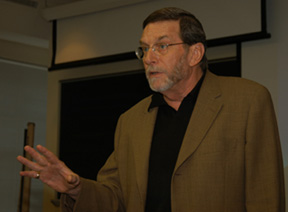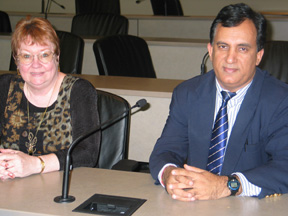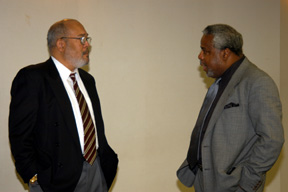 |
Bruce Buehler, M.D., lectures at Morehouse College. |
In October, a major component of these affiliation agreements was inaugurated – the faculty exchange – when Bruce Buehler, M.D., chairman of the department of pediatrics and director, Munroe-Meyer Institute, and Surinder Batra, Ph.D., professor in the department of biochemistry and molecular biology, made presentations at Morehouse College in Atlanta, Ga.
The faculty exchange is a critical component of every affiliation agreement because it allows UNMC faculty the opportunity to share expertise with their peers. It’s anticipated that Morehouse faculty will present at UNMC in the future. In return, the visitors personally experience the learning environment of the students that UNMC hopes to recruit for graduate programs.
 |
Mary McNamee, Ph.D., and Surinder Batra, Ph.D. |
In 1996, Morehouse President Walter E Massey, Ph.D., launched the Campaign for the New Century with the goal of raising $105 million to safeguard Morehouse’s legacy and meet the intellectual, moral and social needs of students who now represent 40 states and 18 countries. Dr. Massey is a noted physicist, former senior vice president and provost of the University of California System and former director of the National Science Foundation.
“UNMC has a lot to offer and it is important to take our message to people who don’t know us yet,” said Dr. Buehler, who made the first visit and lectured on herbal and complimentary medicine. “Faculty exchanges are critical because they are the only way to build trust and trust is what creates long-term cooperation. By getting to know each other personally, our expertise is validated and we get a better idea of things we can do for that institution. Their students see that they can come to UNMC and know that they will be mentored and receive every possible opportunity to make UNMC a great experience.”
 |
David B. Cooke III, Ph.D., left, chair of biology at Morehouse College, talks with UNMC’s John McClain, Ph.D. |
“In the Douglas Center, there was a deep sense of pride and tradition,” Dr. McNamee said. “The walls were covered with displays honoring the founders and describing the struggles of African Americans to attain higher education. And in the middle of this heritage sits the present students, studying alone, in groups or working at computer stations.”
Dr. Batra lectured on UNMC’s pancreatic cancer research and the general issues of cancer among African Americans.
“After conversing with Morehouse faculty, I realized that their students have little understanding of the Midwest,” Dr. Batra said. “I talked a lot about Omaha, the resources at UNMC, the commitment of the surrounding community and the state of Nebraska, and our new Durham Research Center.
“I found the Morehouse students to be well trained as evidenced by the depth of questions they asked after my presentation. I was highly impressed. I want the students and faculty at Morehouse to seek continued collaboration from UNMC, in terms of education and research support, admitting their students to our graduate programs, writing joint grant applications, and more faculty exchanges and internships.”
UNMC’s faculty “hit a home run” in the lecture series, Dr. McClain said. More than 70 students from Morehouse and its sister institution in Atlanta – Spelman College – attended each lecture. Normally, the students rush out at the end of such sessions, but these lectures drew extended attendance for animated question and answer sessions.
The expanded interest also was noted by UNMC’s faculty host at Morehouse – J.K. Haynes, Ph.D., David Packard professor and dean of science and mathematics in the department of biology.
“Diversity is the spice of life,” Dr. Haynes said. “Minorities, young ones in particular, are more skeptical than the average citizen about standard medical practices. We hope that our students will be exposed to more role models who may inspire them to pursue careers in research.
“Morehouse is a potential feeder institution for UNMC that can provide students for medical and graduate schools. UNMC’s summer internship program makes a world of difference because students can now have a positive experience with a university on the other side of the country. Our students are well-prepared, eager to learn and will jump at opportunities to advance their careers.”